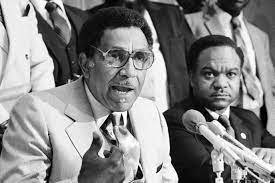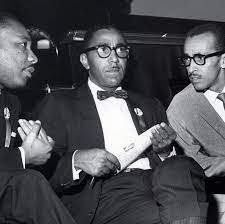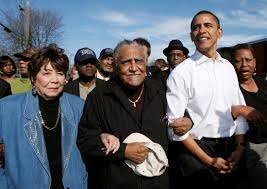Making Home Heavenly – Reverend Dr. Joseph Lowery
Search words: Joseph Lowery + “Joseph Lowery”
Reverend Dr. Joseph Lowery
In his own words, Reverend Dr. Joseph Lowery is “a professional agitator”. Born on October 6, 1921, in Huntsville, Alabama. Dr. Lowery remembers his childhood with fondness saying he has memories of “a happy relationship with my parents, of a competitive, adversarial relationship with my younger sister (laughter), who always wanted to tag along, you know. And I'm, I had to be responsible for her, and yet we had a loving relationship as well when it got over that barrier.”
Beyond his loving household was still a segregated world, Dr. Lowery says, “I remember walking to school a long way, across town to get to the colored school. I remember walking back home in the afternoons, coming through a hostile, white community. I remember a family called Hoopers, a white family. They had some mean boys who got home about the same time we got to their house. Their school was near, closer, and they were home usually when we passed by. And sometimes they would throw rocks. And sometime we'd have a rock battle. Occasionally, we might wrestle a little bit and swing a few fists, but there were about five of them and it'd be two of us. So eventually, we get in a lick or two and then head, (laughter) head home, but, but it was, it never seemed to be anything that anybody got seriously hurt, although we anticipated it with a great deal of fear and trepidation from time to time.”
In his later high school years Lowery started to get input on career choices, “All of my childhood at Lakeside Church, almost every preacher--I guess because I recited so many poems on programs (laughs), that every--almost every preacher would say, you know, boy, that one day the Lord may call you to preach. And I said, yeah, right, you know.” Lowery’s father wanted him to go into business not preaching, “it was only after he heard me preach my first sermon,” Lowery recalls, “that he became reconciled to the fact that, that I was gonna preach. And he was pleased with it. And I thank God that before he died, he came to my third church out in Mobile. It was the first real, major church that I had in Mobile, Alabama. And he came down there--I went to Mobile in '52 [1952]. He came down before he passed in '56 [1956] and saw my ministry and talked with the people in the community who, who appreciated my ministry, the fact that I was concerned about helping people, making their homes heavenly, as well as making heaven their home. And he was very pleased with that.”
God “nagged” Lowery, edging him towards his calling, “I kept waiting on that instance where God would knock me off the horse or off a bicycle, you know, and lightening would flash, and, and the Lord would--a voice from heaven would say, hey, Joe, you got to go preach, you know. But it, it never came. It, it was more or less a, a slow process of, of, of nagging, you know, that this is something--I didn't think, I, I became more and more interested in sermons that I heard.” Lowery also could not reconcile the gospel he loved and the environment he lived in, “I became interested in, in the social aspect of the gospel. I became active in the, in the NAACP Youth chapters and so forth. And when I'd come home back to Huntsville during the summer, I would work with youth activities related to, to, not only church activities, but civic activities. And it just kept nagging on me that, that, that the gospel that I became interested in couldn't, I couldn't reconcile it with the, with the life in, in the South and, and the segregation and the separation and the discrimination and the abuse I had seen.” His pastoral influences helped cultivate this holistic view for him as well, ” Reverend Evans and Reverend Williams, at the senior high and at the college level, both of them were, were ministers who looked at the gospel holistically, that the gospel speaks to the whole person, to his, not only his soul, but his mind and his body and his well being in the community. So that from the very beginning, my interest and attraction to the gospel was related to, to, to civic matters and social conditions. I, I had a tough time reconciling the fact that, that God loved all his children and God created us all equal. The Constitution talked about equality and this sort of thing, and I, I couldn't reconcile that. So from the beginning I was, I had an interest in, in the gospel from the holistic prospective so that it related to, as I said earlier, not only to make heaven your home, but making your home here heavenly. So from the very beginning I was attracted to the gospel by social dimensions as well as its so-called heavenly dimensions.”
Soon, Dr. Lowery met Martin Luther King Jr., “I went to a seminar in Boston once, which was Boston School, the, you know, Methodist school. And there I met Martin [Luther King, Jr.]. And we talked briefly, and then I didn't see him again for a long time…until he came to Dexter in Montgomery, and I was still in Mobile. And, of course, and then the boycott began. But I met him before the boycott at a meeting in Montgomery, the Alabama Council on Human Relations, and he spoke and I spoke. And after the meeting, we exchanged greetings and said we gonna preach--he was coming to Mobile, and I was going to Montgomery, we're gonna preach for each other. And we developed this friendship.” But Lowery and King’s relationship was not only a friendship but an activism partnership. Lowery was president of the Ministry Alliance in Mobile and they decided to desegregate the buses. He recounts the story of the first desegregation ride, “When we rode the buses the first day, we organized the ministers and two-by-two, we rode different bus routes. And Reverend Sam McCree (ph.) and I rode--the fellows said I should ride the Pritchard route. Pritchard was a mean suburb (laughs), cracker country, they called it. And they figured, since I was the leader, I ought to ride out to the, the most dangerous (laughs) thing. I didn't think that was nice. But they thought that was appropriate. So Reverend McCree and I did, and we had had these workshops on how you will react in difficult situations. So we got on the first cross seat on the bus, and we did all right. There were a couple of white people behind us. They didn't seem to say anything, and blacks were in the back. And then a white fellow got on the bus after about five minutes with a sack, obviously, a bottle in the sack. And he sat on the side seat right behind the driver. And at first, he didn't seem to notice that blacks were sitting on the front seat. And, but after a block or so, he looked, and he told the driver, says, "Make 'em move back." And the driver said, "I'll drive, you ride." And he said, "Well, by God, if you don't make 'em move back, I will." So he got up with this sack and this bottle in his hand, and I felt Reverend McCree reach in his pocket, I, I nudged him, cause you're not supposed to have any weapons. He had a little bitty, (laughter) pocket knife, gonna protect himself with that bottle. But then we put into practice what we had rehearsed in the, in the workshops we'd had, nonviolent workshops. We take the initiative. That's one of the firs things they teach you, if you can, in a confrontation, take the initiative. So I stood up, and I said, "Sir, please sit down." I said, "it's dangerous to stand up when the bus is moving. I'm gonna sit down, you should sit down; said, we mean you no harm. I'm sure you don't mean us any harm. Sit down and be comfortable." And to our surprise, he sat down. And then we sat down, and the next stop, he got up and got off the bus. And Reverend McCree and I said, whew, you know. (Unclear) Nobody knew, we, we were as frightened as we could be, but we kept our cool. That nonviolent workshop paid off, and taking the initiative and it disarmed him. And he got off.”
Dr. Lowery with Dr. Martin Luther King Jr. and Wyatt Tee Walker
Lowery’s relationship with Dr. King grew through the Southern Christian Leadership Conference, “SCLC [Southern Christian Leadership Conference] was organized in '57 [1957].” Lowery says, “We started having these meetings in '56 [1956], while the Montgomery Bus Boycott was going on. The organizational meeting was at, was at the Zion Baptist Church in New Orleans in 1957. And Martin was elected president. And I believe, I was elected assistant secretary. But then we had another organizational meeting later in Tallahassee, and I was elected vice president. And I think C. K. Steele was first vice president, and I was second vice president, and Martin was president. Ralph was secretary-treasurer-- financial, secretary treasurer. And I believe, T. J. Jemison in Baton Rouge was elected secretary, and then Fred Shuttleworth was elected assistant secretary. And later when, when Jemison left, Fred Shuttleworth moved up to secretary.”
One of the most notable things he accomplished with SCLC was the 1965 March from Selma to Montgomery, also known as Bloody Sunday. Lowery discusses how he and the rest of SCLC leadership chose Selma based on three things, “One, the fact that it already had been--voter registration efforts had been initiated and rebuffed. Secondly, a black majority in the Black Belt of Alabama. If ever there were instances where blacks out to be able to vote, it was where they could hold office, and where they were the majority. So that was it--and we knew the resistance would be fierce. And so that would get the nation on our side because the nature of the resistance always attracts attention and simplifies the process of change. The more, the more drastic the discrimination, the, the, the more obvious the need for change.”
1965 March from Selma to Montgomery also known as Bloody Sunday
As the activists were met with resistance, not only Alabama State Police, but the National Guard came in to thwart their efforts. They released dogs on the activists, hosed them down, and beat them. Dr. Lowery marched up to the capital to give their petition to Alabama’s Governor George Wallace. George Wallace was notoriously against civil rights efforts, having previously thwarted university desegregation efforts. He refused to meet with SCLC and sent a secretary out instead. A few days later Governor Wallace agreed to meet with a few of them, Lowery describes the call,” Wallace's secretary called me in Birmingham and said, "The governor is gonna meet with certain members of your committee." I said, "I beg your pardon". He's not gonna meet with you nor with many of them, but we'll meet with certain members, said, Gaston, Attorney Shores and people like that. I said, "well, my opinion is, if you don't meet with all of us, you won't meet with any of us.” The next day, the secretary called Lowery back and told him the Governor had agreed to meet with them all.
During the meeting, Governor Wallace was seemingly disinterested, “at the meeting he was tearing up little pieces of paper on the desk all while we were talking. At the end of our conversation, he had a mountain of little pieces of paper on the desk. And I said to him, I said, ‘Governor, I, I'm speaking to you now not as a civil rights leader. I'm speaking as a Methodist preacher to a Methodist layman. God's gonna hold you accountable for what you're doing in resisting what is right; said, ‘you're sewing seeds of violence. You're seeds of, of nullification.’ I said, and, and ‘God's gonna hold you accountable. ‘And, of course, he argued that he was against violence. I said, ‘yes, but the people in the street won't identify with what you argue. They don't have your platform. They get lead pipes and shot guns.’”
Once he became president of SCLC, Lowery initiated reenactments of Bloody Sunday. In ’95 he agreed to meet with Wallace, when he came out to meet us in '95 [1995], there were those with me on that march, reenacting, who didn't want me to meet with him. And I said, I would not stand in the door of his repentance as he stood in the door of the university to, to stop the young people [desegregating]. Incidentally, last May, that same university gave me a Doctor of Humane Letters at its commencement exercises. And I couldn't help but wonder when I marched down the, the aisle to get that honorary degree, I couldn't help but wonder what George was thinking as he saw this rebel-rousing agitator get a degree from the institution where he stood in the schoolhouse door.
Dr. Lowery remained a pillar of activism even well into the 21st century, just like he spoke truth to the man on the bus and Governor Wallace, Lowery encouraged Black leaders to treat former President Barack Obama the same. Hazel Trice Edney describes an interview with him, “I said, ‘Reverend Lowery, how do we--how do black leaders deal with this president [HistoryMaker President Barack Obama]. He's just coming in. You know, what if he doesn't keep his promises to black people? You know, what if they're not satisfied?’ His answer was this: ‘We must speak truth to power no matter what color power is.’”
Dr. Lowery and his wife and fellow activist Evelyn Gibson Lowery with former President Barack Obama
Reverend Dr. Lowery spent his whole life speaking truth to power, always showing his political views through the lens of a holistic gospel. Whether it be through leading a congregation or leading a march, he spent his life improving the condition of the world around him, encouraging people to make heaven their home and make their home here heavenly.
The HistoryMakers Student Ambassador Update
During January, I have been working on setting up all the details for The Black History Contest here at Dillard University. I have been collaborating with my fellow Dillard ambassador Felicia Hart on a poetry slam where students use the digital archive to write an original poem.
I also started an Instagram account for The HistoryMakers at Dillard University to further online outreach. I am in the process of scheduling class presentations of the archive as well.
References
Reverend Dr. Joseph Lowery (The HistoryMakers A2003.185), interviewed by Larry Crowe, August 13, 2003, The HistoryMakers Digital Archive. Session 1, tape 1, story 1, Slating of Joseph Lowery interview
Reverend Dr. Joseph Lowery (The HistoryMakers A2003.185), interviewed by Larry Crowe, August 13, 2003, The HistoryMakers Digital Archive. Session 1, tape 2, story 1, Joseph Lowery describes his childhood memories
Reverend Dr. Joseph Lowery (The HistoryMakers A2003.185), interviewed by Larry Crowe, August 13, 2003, The HistoryMakers Digital Archive. Session 1, tape 2, story 4, Joseph Lowery discusses his early occupational options
Reverend Dr. Joseph Lowery (The HistoryMakers A2003.185), interviewed by Larry Crowe, August 13, 2003, The HistoryMakers Digital Archive. Session 1, tape 2, story 6, Joseph Lowery recalls being called to the ministry
Reverend Dr. Joseph Lowery (The HistoryMakers A2003.185), interviewed by Larry Crowe, August 13, 2003, The HistoryMakers Digital Archive. Session 1, tape 3, story 3, Joseph Lowery describes his Civil Rights efforts in Mobile, Alabama
Reverend Dr. Joseph Lowery (The HistoryMakers A2003.185), interviewed by Larry Crowe, August 13, 2003, The HistoryMakers Digital Archive. Session 1, tape 3, story 4, Joseph Lowery recalls the beginnings of the Southern Christian Leadership Conference
Reverend Dr. Joseph Lowery (The HistoryMakers A2003.185), interviewed by Larry Crowe, August 13, 2003, The HistoryMakers Digital Archive. Session 1, tape 4, story 1, Joseph Lowery remembers the Selma to Montgomery civil rights march, 1965
Hazel Trice Edney (The HistoryMakers A2013.339), interviewed by Larry Crowe, December 3, 2013, The HistoryMakers Digital Archive. Session 1, tape 6, story 7, Hazel Trice Edney talks about the importance of accountability in black leadership, pt. 2




